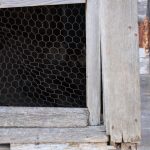Chickens can be a delightful addition to any backyard, providing fresh eggs and a touch of rural charm. However, they can also wreak havoc on your carefully tended garden. Chickens are natural foragers, and they will eagerly peck and scratch at the soil in search of insects, seeds, and tender plant shoots. This can result in uprooted plants, damaged foliage, and bare patches of soil where your prized vegetables once grew. Additionally, their droppings can introduce harmful bacteria and parasites into the soil, posing a health risk to both humans and other animals. Understanding the impact that chickens can have on your garden is the first step in finding effective solutions to protect your plants and maintain a harmonious backyard environment.
Chickens are also notorious for their love of dust baths, which can further damage your garden. They will create shallow depressions in the soil and vigorously flap their wings to create a cloud of dust, which not only disturbs the soil and uproots plants but can also create unsightly patches in your garden. Furthermore, their constant scratching and pecking can lead to erosion and soil compaction, which can have long-term detrimental effects on the health and fertility of your garden soil. It’s important to recognize the full extent of the threat that chickens pose to your garden in order to take proactive measures to protect your plants and maintain a thriving outdoor space.
Table of Contents
- 1 Creating physical barriers: Fencing and netting to protect your plants
- 2 Using natural deterrents: Plants and scents that repel chickens
- 3 Implementing scare tactics: Noisemakers and visual deterrents to keep chickens away
- 4 Establishing a designated chicken-free zone: Creating a separate area for your garden
- 5 Seeking professional help: Consulting with experts for additional advice and solutions
- 6 Understanding the legalities: Know your rights and responsibilities when dealing with chickens on your property
Creating physical barriers: Fencing and netting to protect your plants
One of the most effective ways to protect your garden from the destructive tendencies of chickens is to create physical barriers that prevent them from accessing your plants. Fencing is a popular option for keeping chickens out of specific areas of your garden. A sturdy fence with small gaps or mesh can effectively deter chickens from entering your garden beds and flower borders. It’s important to ensure that the fence is securely anchored to the ground to prevent chickens from digging underneath it. Additionally, you may need to consider adding a roof or netting over the top of your garden area to prevent chickens from flying over the fence and gaining access to your plants from above.
Netting is another useful tool for protecting your garden from chickens. Lightweight and flexible, netting can be draped over individual plants or entire garden beds to create a physical barrier that prevents chickens from pecking at your crops. It’s important to choose netting with small enough gaps to prevent chickens from getting their heads or beaks through, as they are persistent and resourceful creatures. While physical barriers such as fencing and netting can be highly effective in protecting your plants from chickens, it’s important to regularly inspect and maintain these barriers to ensure that they remain intact and functional.
Using natural deterrents: Plants and scents that repel chickens
In addition to physical barriers, there are a variety of natural deterrents that can help keep chickens away from your garden. Certain plants are known for their ability to repel chickens due to their strong scents or unpalatable taste. For example, marigolds are often used as a natural deterrent for chickens, as their pungent scent is unappealing to these birds. Planting marigolds around the perimeter of your garden or interspersed among your crops can help discourage chickens from venturing too close to your plants. Similarly, lavender, rosemary, and thyme are all fragrant herbs that can help repel chickens with their strong scents.
In addition to planting deterrent plants, you can also use natural scents to keep chickens away from your garden. Citrus peels, garlic cloves, and hot peppers are all known for their ability to repel chickens due to their strong odors. You can scatter these items around your garden or create a natural spray by steeping them in water and then applying the solution to your plants. The strong scents will help deter chickens from approaching your garden and protect your plants from their destructive behavior. By incorporating natural deterrents such as fragrant plants and strong scents into your garden, you can create an environment that is less appealing to chickens and reduce the risk of damage to your plants.
Implementing scare tactics: Noisemakers and visual deterrents to keep chickens away
Scare tactics can be an effective way to keep chickens away from your garden without causing them harm. Noisemakers such as wind chimes, bells, or even a radio playing at low volume can help deter chickens by creating unexpected sounds that startle them and encourage them to move away from your garden. You can strategically place these noisemakers around your garden to create a perimeter of sound that discourages chickens from entering the area. Additionally, visual deterrents such as scarecrows or reflective objects can help keep chickens at bay by creating movement and light that makes them feel uneasy.
Another effective visual deterrent for chickens is the use of predator decoys such as plastic owls or hawks. Chickens are naturally wary of predators, and the sight of a lifelike decoy can be enough to keep them away from your garden. It’s important to regularly move these decoys around your garden to prevent chickens from becoming accustomed to their presence. By implementing scare tactics such as noisemakers, visual deterrents, and predator decoys, you can create an environment that is less inviting to chickens and reduce the risk of damage to your plants.
Establishing a designated chicken-free zone: Creating a separate area for your garden
If you have the space available, creating a designated chicken-free zone in your backyard can be an effective way to protect your garden from the destructive behavior of these birds. By establishing a separate area for your garden that is enclosed with fencing or netting, you can create a safe space for your plants that is off-limits to chickens. This allows you to tend to your garden without having to worry about chickens causing damage or spreading harmful bacteria in the soil. Additionally, creating a designated chicken-free zone can help maintain a harmonious backyard environment by providing a space where both you and your chickens can coexist without conflict.
When creating a designated chicken-free zone for your garden, it’s important to consider the specific needs of your plants and the layout of your backyard. You may need to install raised beds or containers to protect your plants from potential chicken damage, or incorporate additional physical barriers such as trellises or cloches to provide extra protection. It’s also important to ensure that the designated chicken-free zone is easily accessible for you to tend to your plants while remaining secure and off-limits to chickens. By establishing a separate area for your garden that is protected from the presence of chickens, you can create a thriving outdoor space that allows both you and your feathered friends to enjoy the backyard without conflict.
Seeking professional help: Consulting with experts for additional advice and solutions
If you’re struggling to protect your garden from the impact of chickens, it may be helpful to seek professional advice and assistance. Consulting with experts such as local farmers, agricultural extension agents, or poultry specialists can provide valuable insights into effective strategies for managing chickens in a backyard setting. These professionals can offer advice on best practices for protecting your plants from chicken damage, as well as recommendations for natural deterrents, scare tactics, and other solutions that are tailored to your specific situation.
In addition to seeking advice from experts, you may also consider enlisting the help of professional contractors or landscapers who specialize in creating chicken-proof gardens. These professionals can assess the layout of your backyard and provide customized solutions for protecting your plants from chicken damage, such as installing secure fencing, netting, or other physical barriers. By seeking professional help and consulting with experts who have experience in managing chickens in a backyard setting, you can gain valuable knowledge and support that will help you effectively protect your garden and maintain a thriving outdoor space.
Understanding the legalities: Know your rights and responsibilities when dealing with chickens on your property
When dealing with chickens on your property, it’s important to understand the legalities surrounding their presence and how they may impact your ability to protect your garden. Depending on where you live, there may be local ordinances or regulations that govern the keeping of chickens in residential areas. It’s important to familiarize yourself with these laws and ensure that you are in compliance with any requirements related to keeping chickens on your property.
In addition to understanding the legalities surrounding the keeping of chickens, it’s also important to know your rights and responsibilities as a property owner when it comes to protecting your garden from potential damage caused by these birds. In some cases, you may have legal recourse if chickens belonging to a neighbor are causing damage to your property. It’s important to document any instances of damage caused by chickens and communicate with the owner in a respectful manner in an attempt to resolve the issue amicably.
By understanding the legalities surrounding the presence of chickens on your property and knowing your rights and responsibilities as a property owner, you can navigate potential conflicts with neighbors or local regulations while effectively protecting your garden from damage caused by these birds. It’s important to approach any legal issues related to chickens on your property with patience and diplomacy in order to find mutually beneficial solutions that allow both you and your neighbors to enjoy a harmonious backyard environment.
Meet Walter, the feathered-friend fanatic of Florida! Nestled in the sunshine state, Walter struts through life with his feathered companions, clucking his way to happiness. With a coop that’s fancier than a five-star hotel, he’s the Don Juan of the chicken world. When he’s not teaching his hens to do the cha-cha, you’ll find him in a heated debate with his prized rooster, Sir Clucks-a-Lot. Walter’s poultry passion is no yolk; he’s the sunny-side-up guy you never knew you needed in your flock of friends!







